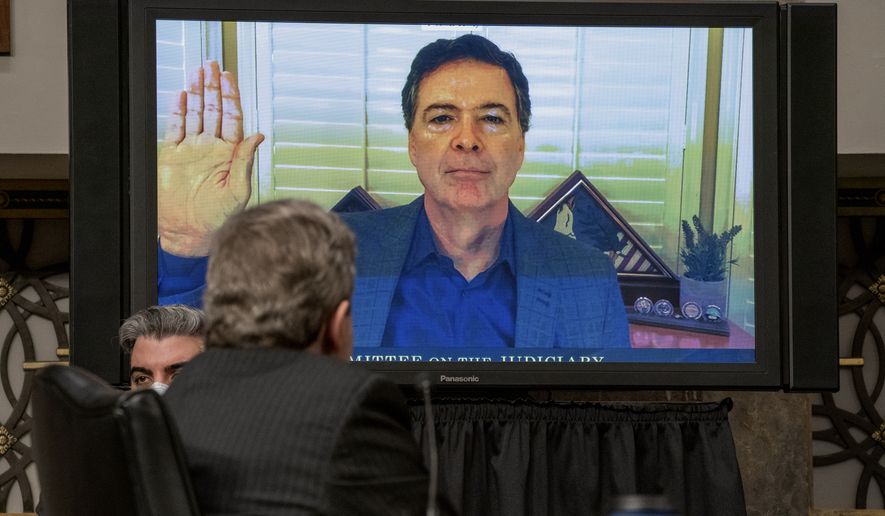Former FBI Director James B. Comey on Wednesday acknowledged that the bureau bungled the handling of surveillance of a Trump campaign adviser, but he refused to take any personal blame and insisted that his failure was in trusting the process.
Mr. Comey said he was proud of the Russia-Trump investigation. He said it was good work overall despite “embarrassing” lapses that included an FBI lawyer’s distortion of evidence and the bureau’s withholding and/or muddying of key facts to a secret court that approved the FBI’s spying on Trump adviser Carter Page.
“It was done by the book, it was appropriate, and it was essential that it be done,” Mr. Comey said.
But during four hours of testimony to the Senate Judiciary Committee, Mr. Comey repeatedly said he wasn’t aware of much of what was going on beneath him.
He said he didn’t know the key source used to produce the largely discredited anti-Trump Steele dossier, which was an integral part of the warrant certification Mr. Comey signed. That source is now known to have been investigated as a Russian intelligence operative. Nor did Mr. Comey know what steps the FBI took to verify the dossier.
He also pleaded ignorance when pressed over Kevin Clinesmith, the former FBI lawyer who admitted last month that he altered evidence to hide the fact that the CIA was working with Mr. Page. That revelation could have undercut the FBI’s insinuation that Mr. Page was colluding with Russia.
“I know nothing of Mr. Clinesmith,” Mr. Comey said.
Given those answers, Republicans wondered how he could defend the operation.
“With all due respect, you don’t seem to know anything about an investigation that you ran,” said Sen. Mike Lee, Utah Republican.
Added Sen. Ben Sasse, Nebraska Republican: “It was your culture. You were the leader.”
Mr. Comey also pleaded ignorance over a stunning revelation that the U.S. intelligence community asked him to investigate whether Hillary Clinton’s campaign “stirred up” a scandal linking Donald Trump to Russia in order to distract from her own political travails.
Director of National Intelligence John Ratcliffe revealed Tuesday that the intelligence community made an investigative referral in September 2016. He said the referral went directly to Mr. Comey and Peter Strzok, who at the time was the FBI’s deputy assistant director of counterintelligence.
Mr. Comey told the committee it didn’t “ring any bells” with him.
He declined to discuss the disclosure when pressed further.
“I don’t understand Mr. Ratcliffe’s letter well enough to comment,” Mr. Comey said. “It’s confusing and contains within it a statement that it’s unverified information. So I really don’t know what he’s doing.”
Committee Chairman Lindsey Graham, South Carolina Republican, was stunned.
“There was a two-tiered system here,” he said. “When it came to Trump, there were no rules, plow ahead. Ignore everything. Lie if you need to. Alter documents. When it came to Clinton, seems to be a completely different standard.”
Democrats have said the information Mr. Ratcliffe revealed is Russian disinformation, though the intelligence director has rejected that description. Mr. Graham said he is less worried about the original claims than why the FBI didn’t bother to pursue them.
The FBI’s Trump-Russia probe, dubbed Crossfire Hurricane, has been pilloried over mistakes.
Justice Department Inspector General Michael Horowitz said FBI agents made omissions and errors that tainted the application for a Foreign Intelligence Surveillance Act warrant on Mr. Page.
Mr. Horowitz also criticized the FBI for its reliance on a salacious, unverified dossier compiled by former British spy Christopher Steele.
In one exchange, Mr. Comey acknowledged that if he knew what he knows today about the Page warrant application, he wouldn’t have signed off on it as is.
“No. Not without a more fuller discussion about how they were thinking about their obligations to the court,” he said.
Mr. Graham was skeptical.
“How is it possible that an investigation at this level, none of this information that is damning to the case never makes it to the top?” he said. “Everybody’s responsible, but nobody’s responsible. Somebody needs to be responsible for misleading the court.”
Mr. Comey ultimately said he was responsible for the mistakes, though he still defended the investigation as a whole.
“It’s embarrassing. It’s sloppy. I’m running out of words,” he said. “There is no indication — and the inspector general would say if he found it — that people were doing bad things on purpose, but that doesn’t make it any less concerning or embarrassing.”
Mr. Comey said the fault lies with the FBI’s internal controls.
“I think all of us, me in particular, took comfort in the complexity of the layers and layers of review and oversight associated with FISA, and I actually think, given that they found problems in every FISA application, what we thought was a good thing was actually a bad thing,” he said.
Democrats downplayed the FBI’s mistakes. They noted that Mr. Horowitz found the investigation was opened properly and insisted that the Steele dossier didn’t play a role in the overall probe.
Sen. Amy Klobuchar, Minnesota Democrat, said the committee should be focused on issues such as election security, the coronavirus crisis and the threat from White supremacists.
“There is an election coming up in a few weeks and … there are a lot of concerns right now about Russia, not about what Mr. Comey was involved in years ago,” she said.
Mr. Graham said Congress would have a hard time renewing the FISA process without figuring out what went wrong in 2016.
Mr. Sasse said Russia’s actions are minor compared with China’s.
“We’re headed toward a world where if we don’t fix the national security branch and the counterintelligence pieces of the FBI, we’re not going to have an intelligence community that will have the trust of the American people when they’re going to have to employ bigger and more far-reaching digital tools in the future,” he said.
• Jeff Mordock can be reached at jmordock@washingtontimes.com.




Please read our comment policy before commenting.